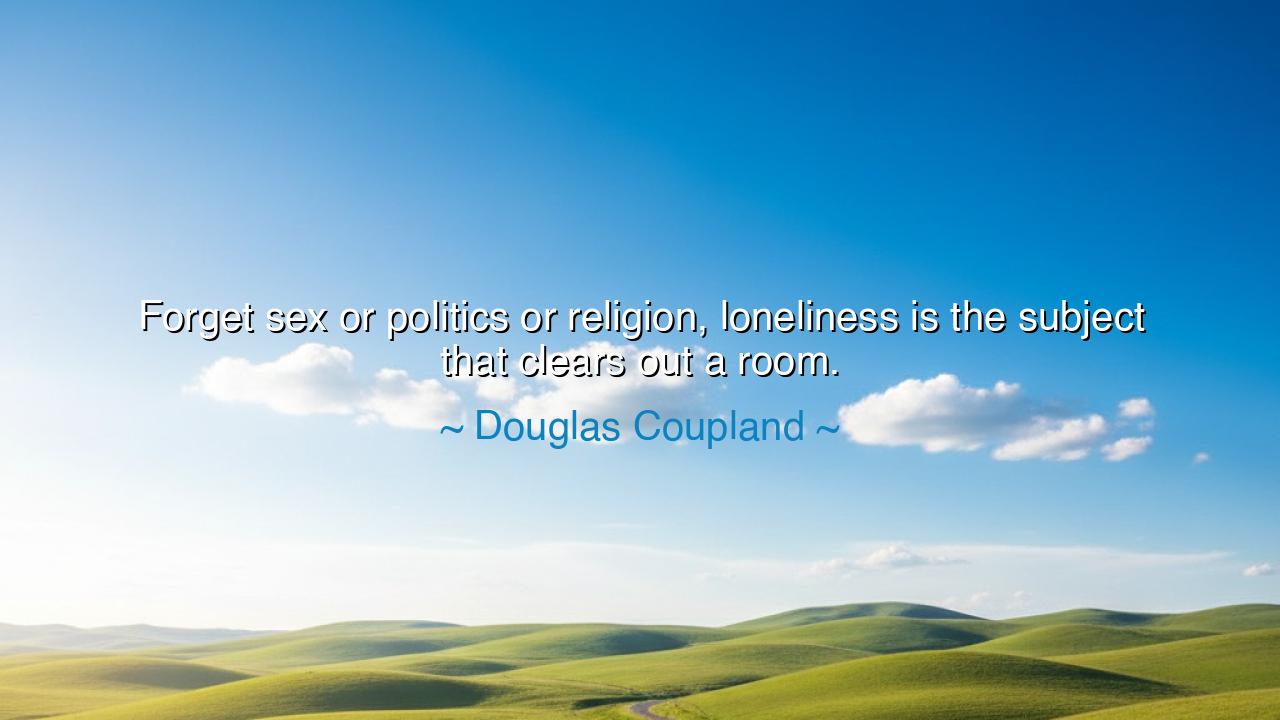
Forget sex or politics or religion, loneliness is the subject






“Forget sex or politics or religion, loneliness is the subject that clears out a room.” Thus spoke Douglas Coupland, the chronicler of modern alienation, whose words echo not merely as an observation, but as a lament for the age of disconnection. In this stark truth lies a revelation about the human heart: that while we can argue about belief, desire, or power without shame, we tremble when faced with the quiet ache of loneliness. For to admit one’s solitude is to strip away all masks, to reveal the vulnerable soul that hides beneath the noise of the world. It is the most human confession—and therefore, the one most feared.
Coupland, who rose to fame as the voice of Generation X, wrote in a time when technology began to weave invisible walls between people, even as it promised to bring them together. His words were born from observing a culture that had learned to discuss everything—sex, politics, religion—with loud opinions but had forgotten how to speak about emptiness. To speak of loneliness is to shatter the illusion of control, to admit that despite our connections, our achievements, our distractions, we remain achingly alone at the core. Thus, it “clears out a room,” for when loneliness is mentioned, all fall silent—each recognizing the wound within themselves yet fearing to meet it in another.
In every age, the wise have spoken of this same emptiness. The ancient Stoic Marcus Aurelius wrote that “we are born alone, and we die alone,” yet he urged that in between, we find meaning through service and virtue. The Buddhist monks of old sought enlightenment not by fleeing loneliness but by embracing solitude, transforming it into inner peace. Yet the modern soul, unlike the ancient, has forgotten how to sit with itself. Surrounded by endless distraction, it mistakes noise for company and motion for purpose. When the noise fades, the silence becomes unbearable. And so, as Coupland observed, when the word “loneliness” enters the air, it unsettles us—because it calls us back to the truth we most avoid: that no amount of conversation or possession can fill the space meant for connection and understanding.
Consider the story of Emily Dickinson, the reclusive poet of Amherst, who lived much of her life in isolation, writing to the world she would never see. Her solitude was deep, her loneliness profound. Yet out of that stillness came words that touched eternity—poems of longing, faith, doubt, and beauty that spoke to hearts centuries later. She turned loneliness into creation, absence into art. What the world called isolation, she transformed into communion. In her example, we see that loneliness is not shameful, but sacred—a mirror reflecting our hunger for meaning and intimacy.
Coupland’s wisdom is not meant to sadden, but to awaken. He reminds us that in a world obsessed with conversation, we have lost the ability to speak about what truly matters. We dare to debate God and government, but not the emptiness that gnaws at our souls when the night grows quiet. The fear of loneliness binds us tighter than any chain, for it whispers that we are unworthy of love, that our pain is unique, that our longing is weakness. But in truth, loneliness is the one experience we all share, the silent thread that weaves humanity together. When we hide it, it divides us. When we name it, it unites us.
To overcome the power of loneliness, one must first face it. Sit with it, as one would with an old friend. Do not flee into distraction, for distraction is the enemy of peace. Instead, reach toward others—not through the armor of pretense, but with sincerity. Speak honestly of your need for connection, for it is not a flaw, but a flame that reminds you you are alive. In community, in vulnerability, loneliness loses its sting. As the mystics taught, the soul that dares to reveal its emptiness becomes a vessel through which love can enter.
So, my child of the silent generation and the glowing screen, remember this: loneliness is not your enemy—it is your teacher. It shows you what your heart craves, what your spirit lacks, what your humanity requires. Do not let it drive you into despair, but let it lead you back to compassion—for yourself and for others. When next you find yourself in a room where laughter hides pain, where words avoid depth, speak gently of loneliness. Do not fear the silence that follows. In that silence, something sacred begins—the recognition that no one is truly alone who dares to reach beyond their solitude.
Thus, Coupland’s truth endures: “Forget sex or politics or religion—loneliness is the subject that clears out a room.” For it is the most honest of all subjects, the one that strips us bare and reveals our shared humanity. Yet if we can face it—if we can speak of it without shame—we will find in its depths the seed of connection itself. For the cure to loneliness has always been the same: to love, and to be brave enough to be known.






AAdministratorAdministrator
Welcome, honored guests. Please leave a comment, we will respond soon